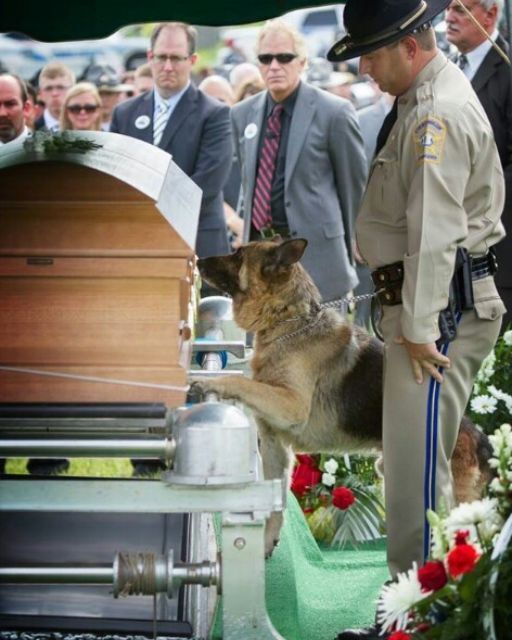They said the dog hadn’t eaten since it happened.
Four long days.
Four days of restless pacing, soft whines, and rejecting every hand that tried to pull him away from the front door. Until this morning, when they finally allowed him to ride in the patrol car one last time.
He jumped in as if he already knew the destination.
The ceremony was quiet, somber. Badges gleamed, flags folded with meticulous care. I lingered at the back, not fully part of the crowd but unable to stay away. I had watched them together countless times—the officer and his K9, moving as if they shared one mind and two bodies. Everyone spoke of the dog’s training, his sharp instincts, his adherence to protocol. But I’d seen it—the unshakable loyalty. The way he’d gaze at his handler, unwavering, as though the entire world could crumble, and he wouldn’t move a muscle until commanded.
And now, here he was.
His front paws rested on the casket, his nose pressed gently against the wood.
No barking. No growling.

Just… sniffing. Slow and steady, as if he were trying to piece together something that didn’t make sense.
The officer holding the leash looked like he was on the edge of breaking. His grip was tight, knuckles pale. The dog didn’t seem to notice. Or maybe he didn’t care. Maybe this was his way of seeking the truth, checking the facts for himself.
Because here’s the thing no one wanted to confront—
His partner wasn’t supposed to be on duty that night.
And the call they were sent on? There’s no record of it.
And the voice on that final radio transmission? It didn’t sound like his partner’s.
The K9 finally let out a low, sharp whine.
And that’s when I noticed it—a tiny scrap of folded fabric wedged behind the casket’s base. A shred of uniform.
But it wasn’t his.
It was a darker shade of blue, a different fabric. And the smell… acrid. Like burnt metal mixed with something else I couldn’t place. In that moment, looking at that scrap of fabric, I knew something was terribly wrong.
The next few days blurred together. I wasn’t a cop—just a local journalist—but something inside me screamed that this story was bigger than anyone realized. I dug deep, pulling strings and asking questions. Most people shut me down, told me to let it go, to accept it as a tragedy, plain and simple.
But Valor, the German Shepherd, wouldn’t let it go. He was back at the precinct, restless, pacing, refusing to leave the empty desk where his handler once sat. The other officers tried to comfort him, but nothing worked. He knew something they didn’t.
I managed to get my hands on the radio logs and the official reports. And that’s when I found something strange. The last call—the one that supposedly sent Officer Silas to his death—was flagged as a “phantom call.” No address. No caller ID. Nothing. Just a garbled message and a location.
The location? An abandoned warehouse on the outskirts of town, a known hub for illegal activity. But there was no sign of anything happening that night. No witnesses. No evidence. Just Silas, gone.
I started tracing the origins of that fabric scrap. I took it to the local uniform supplier and asked if they recognized it. They did. It was a custom fabric, used exclusively by a private security firm—not the police.
That’s when it hit me: Silas hadn’t been killed in some random incident. He’d been targeted. And whoever was behind it was trying to erase their tracks.
I went to the warehouse. The air was damp, thick with decay. Valor was there too, somehow slipping past the precinct’s security. He was sniffing around a corner, tail low, ears alert.
I followed him, and that’s when we found it—a hidden room, concealed behind a false wall. Inside, a computer, a radio transmitter, and a pile of burnt documents. The smell of burnt metal hung in the air, stronger now.
The computer was password-protected, but with some help from a tech-savvy friend, I bypassed it. What I found was stunning. Silas had uncovered a web of corruption involving local officials and the private security firm. They were running a smuggling operation, using the warehouse as a drop-off point.
The phantom call had been a setup, designed to lure Silas out of the way. The radio transmission? A voice modulator mimicking his voice. They thought they’d covered their tracks. They were wrong. They’d underestimated Valor.
The twist? Valor, because of his deep bond with Silas, had detected something else at the warehouse—a faint trace of a rare, imported wood polish. The same polish used on the handles of a custom-made set of batons belonging to the leader of the security firm. Valor, following this almost imperceptible scent, led me to a hidden compartment in the security firm’s office.
There, we uncovered the missing radio logs, the original call, and a confession recorded by Silas just before his death. He had known they were coming for him.
The case was reopened. The corrupt officials and the security firm were brought to justice. And Valor, the loyal K9, became a hero.
The lesson here? Truth has a way of revealing itself, even in the darkest of times. Loyalty—no matter where it comes from—can be a powerful force. And sometimes, it takes a dog’s nose to uncover the truths humans can’t see.
Never underestimate the power of intuition, the importance of loyalty, and the relentless pursuit of truth. Even when it feels like the odds are impossible, keep digging, keep searching, and trust your gut.
If this story spoke to you, please share it. And if you appreciated it, give it a like. Your support helps keep stories like this alive.